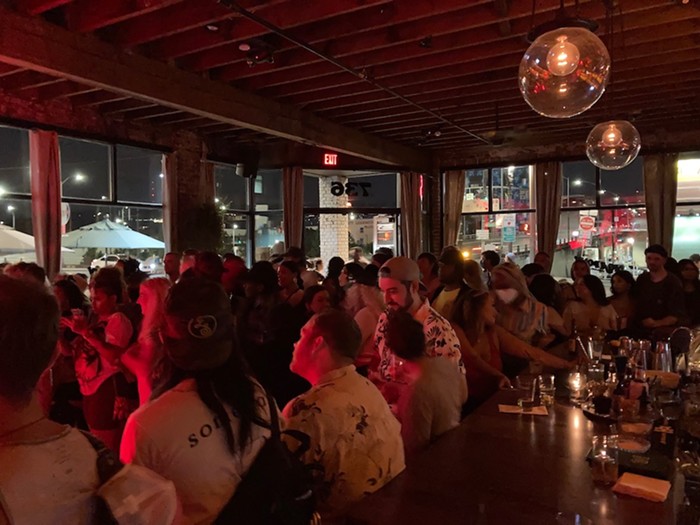SINCE DAVID BOWIE'S death, his lyrics have taken on an eerie second life. I don't just mean the lyrics specifically from Blackstar, the exquisite, gutting farewell album that came out on his 69th birthday, two days before he died. Bowie's entire catalog is littered with prescient lyrics about passing on from the material world.
Mortality and the afterlife loom in his first-ever hit, 1969's "Space Oddity." ("Though I'm past 100,000 miles/I'm feeling very still/And I think my spaceship knows which way to go/Tell my wife I love her very much." "She knows!" Ground Control helpfully replies.) With his breakthrough album, 1972's The Rise and Fall of Ziggy Stardust and the Spiders from Mars, Bowie upped the ante, turning Major Tom's singular, doomed fate into that of all mankind, detailing an apocalypse presaged by an astral visitor. (On the concert tours that followed, Bowie performed Jacques Brel's "My Death," in case songs like "Five Years" and "Rock 'n' Roll Suicide" didn't drive the point home fast enough.) Later tracks like "Fantastic Voyage" and "Heroes" continue the fatalistic bent, and the threat of catastrophe even traipses around the edges of his dancehall anthem, "Let's Dance." ("Let's dance/For fear your grace should fall/Let's dance/For fear tonight is all.")
It could be said that David Bowie died dozens of times before he actually departed this mortal plane on Sunday, January 10, 2016. The first was in 1966, when he abandoned his Christian name, David Jones (a professional decision made when another Englishman with the same name began making waves over in America on a television show called The Monkees). The newly renamed David Bowie attempted multiple careers before "Space Oddity"—and, later, Ziggy Stardust—caught on. He was at various times a hard-hitting mod, an Anthony Newley-type music-hall song-and-dance man, a longhaired utopian hippie who founded the Beckenham Arts Lab, an actual mime, and an earnest folksinger armed with only a 12-string guitar and a parcel of feelings. None of those phases stuck, thank goodness, and Bowie, indicating the pattern that would become the hallmark of his chameleonic career, jettisoned his identity again and again.
Even when people started paying attention, Bowie remained difficult to pin down: The heavy-metal thrombosis of 1970's The Man Who Sold the World could not be more at odds with the lilting, piano-led ballads of 1971's Hunky Dory. And in 1973, at the height of his initial rise to fame, the newly minted superstar announced his retirement from the stage of the Hammersmith Odeon. "Not only is it the last show of the tour," he informed a crowd of weeping fans, "it's the last show that we'll ever do."
It didn't stick. Bowie recorded a covers album and one more glam-rock masterpiece (yes, I'm talking about Diamond Dogs) and even returned to live performance. But as soon as he did, he committed professional seppuku again—first hinted at on the uneven David Live album, which paved the way for the fruits to come on Young Americans, a slice of Philadelphia soul whose buttery disco grooves and slinky harmonies signal one of the most staggering volte-faces in pop music history. It got weirder from there, too, with the art-funk of 1976's Station to Station (which accompanied Bowie's closest flirtation with actual death, a period where the wraithlike musician subsisted entirely on red peppers, milk, and cocaine). And so on and so on, to the legendary avant-pop experiments of the so-called "Berlin" trilogy of the late '70s, to the arena-rock juggernaut of 1983's Let's Dance (and the subpar albums that followed), to the drum-and-bass dabbling of 1997's Earthling.
David Bowie, shapeshifter and skinwalker, was able to take up these mantles and roles with the efficacy and emotionlessness of an actor, or possibly an android. What's more important, though, is how he was so unquestioningly, preternaturally comfortable with the act of letting go—a trait that distinguishes him from virtually all of his megastar peers, who cling to the musical identities they established in the '60s and '70s as if their lives depend on it. (Their livelihoods certainly do.) Bowie was not cut from the same cloth; Bowie carried no sentiment about his own work. Perhaps because he struggled for years in the early part of his career to find an identity, he became a master of several, and once he'd accomplished what he set out to do, he knew how to turn his latest form into ashes (to ashes).
Which makes the self-written elegy of Blackstar so incredibly moving. Make no mistake—this is the greatest deliberate farewell a musician has composed since Mozart's Requiem and Beethoven's Grosse Fuge. Diagnosed with cancer, Bowie stared into the void that had inspired such self-lacerating, fatalistic fantasies as "Quicksand" and "Always Crashing in the Same Car." And for perhaps the first time in Bowie's life, the void spit back truth.
"Look up here, I'm in heaven," he sings on "Lazarus." "I've got scars that can't be seen/I've got drama, can't be stolen/Everybody knows me now." And later: "You know, I'll be free/Just like that bluebird/Now ain't that just like me."
That sliver of time between the album's release and Bowie's death two days later will forever remain precious to Bowie fans—a brief weekend where the possibilities of his future seemed ripe and never-ending. With 2013's The Next Day, he'd returned to us (like Lazarus) after a nearly decade-long period of silence, and initially, Blackstar seemed like a brilliant advance of his pieces across the chessboard. In hindsight, it seems so obvious that Blackstar is the sound of David Bowie saying goodbye—to his fans, to his home, to his family, to his own life's work. It's simultaneously his most human and honest album and one of the craziest, most challenging things he's ever done.
On Blackstar's final track, "I Can't Give Everything Away," a harmonica chirps in the background, echoing a part in 1977's instrumental "A New Career in a New Town" (a song whose title, like so many things in Bowie's bountiful catalog, serves as a marvelous epitaph). Over a skittering drumbeat and swelling keyboards, Bowie bids adieu:
Seeing more and feeling less
Saying no but meaning yes
This is all I've ever meant
That's the message that I sent
I can't give everything away
It was Bowie's final role, and the one that meant the most: himself. It was also the only role that got under his skin, a role that didn't care about magazine covers and hit singles and Live Aid concerts and Mick Jagger duets. It was the one role Bowie wasn't ready to let go of.
"I can't give everything away," he sings, perhaps as an apology to his fans. I've given you as much as I could, but now I have to stop, he seems to be telling us. You'll have to do the rest without me.
But with more than five decades of music (and art, and film, and more) bearing David Bowie's name, we've been given as great a body of work as any human in history has ever committed. Only now do the riddles in his albums, the puzzles in his lyrics, the enigmas in his videos and album covers come into complete focus. Only now do we get to see the full person, the complete artist and man that David Bowie was. It's a beautiful portrait.
"I can't give everything away," Bowie sings. I hope he knows he gave us more than enough.
MORE DAVID BOWIE...
"Portland's Big-Screen Tributes to David Bowie," by Erik Henriksen
"David Bowie's Dead, and It Sucks," by Ned Lannamann
"Beyond Labyrinth: David Bowie on Film," by Erik Henriksen



















